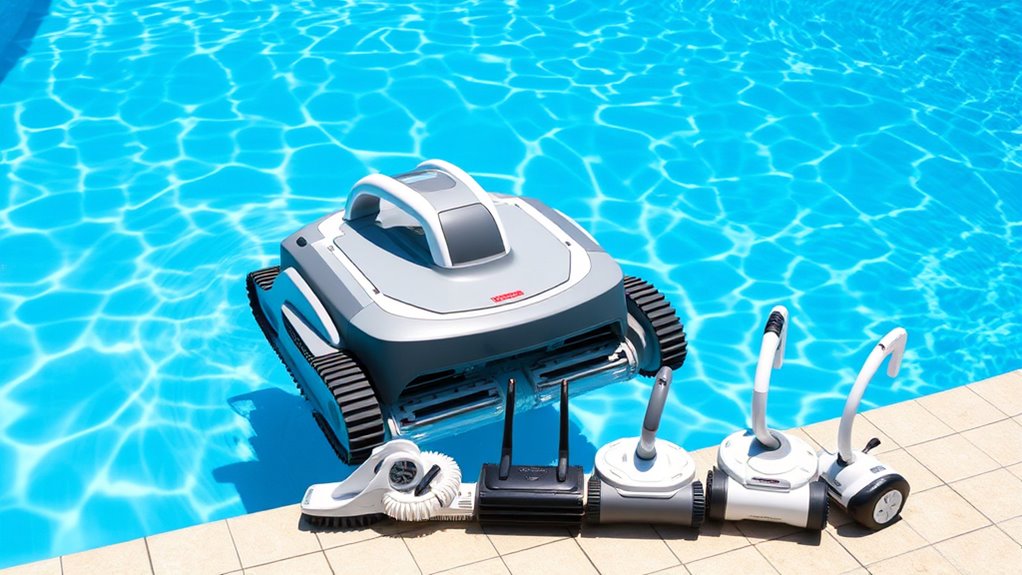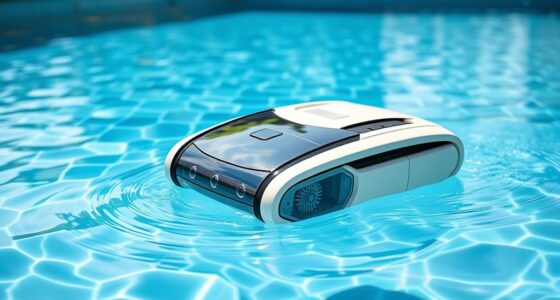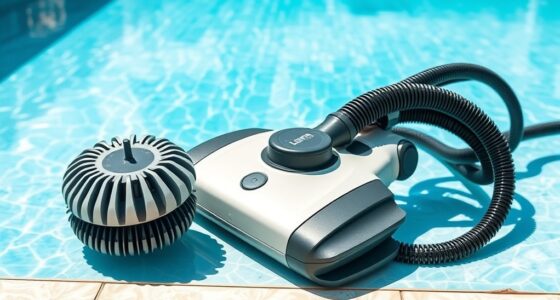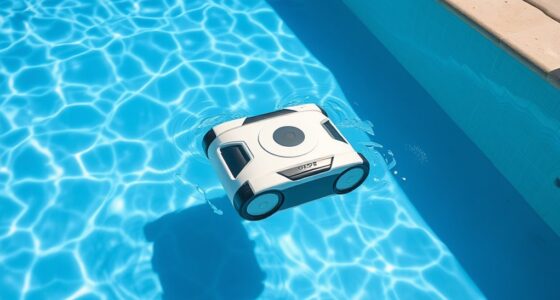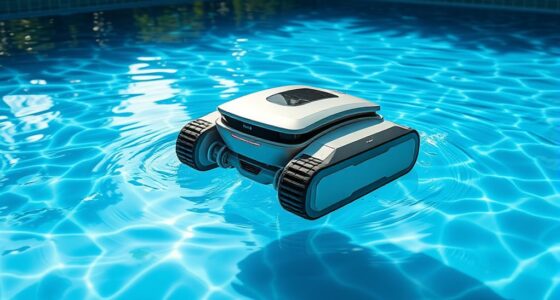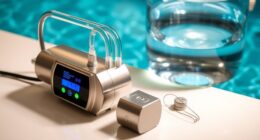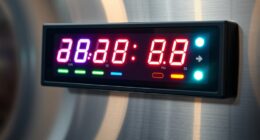To pick the right automatic pool cleaner, consider your pool’s size, shape, and surface material to determine what type suits your needs—robotic, suction-side, or pressure-side. Assess debris types and your budget to find features like filtration efficiency and energy use that offer value. Research brands, reviews, and warranties to guarantee reliability. If you want to make a well-informed choice tailored to your pool, keep exploring the options available.
Key Takeaways
- Assess your pool’s size, shape, and surface material to determine suitable cleaner types and features.
- Consider debris types and behavioral patterns to select the most effective cleaning technology.
- Set a budget and compare models based on features, durability, brand reputation, and warranty.
- Evaluate energy efficiency and smart features to enhance convenience and long-term savings.
- Follow manufacturer instructions for setup and maintenance to ensure optimal performance and longevity.
Understanding Different Types of Automatic Pool Cleaners
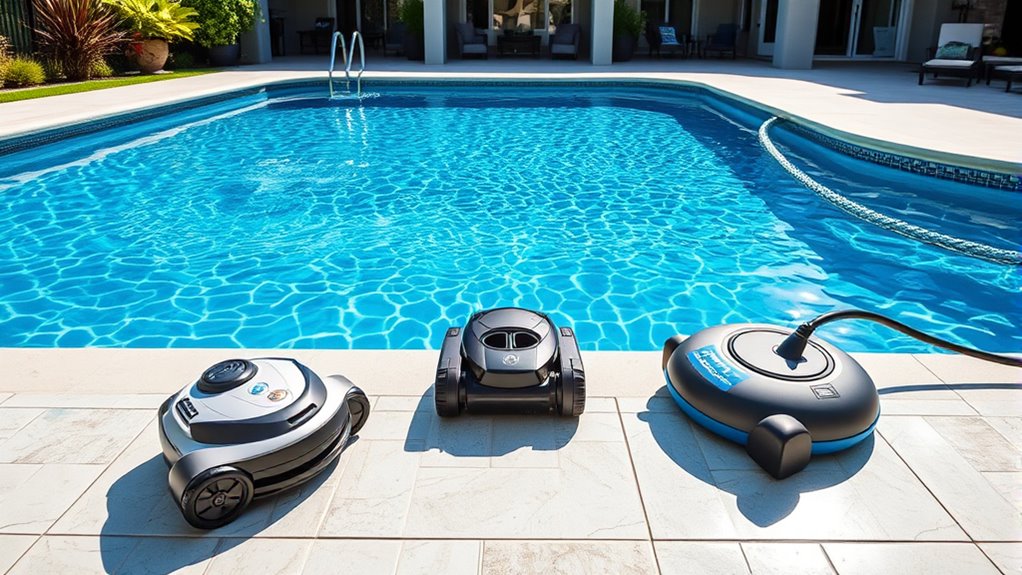
When it comes to automatic pool cleaners, understanding the different types available can help you choose the best one for your needs. Robotic cleaners excel in robotic efficiency, using advanced navigation systems to scrub surfaces thoroughly and cover the entire pool. They often feature adjustable brushes and filters, making them highly effective for various surface types. Suction-side cleaners rely on your pool’s pump to generate suction power, making them a budget-friendly option. They’re great for regular maintenance but may struggle with larger debris or intricate surfaces. Pressure-side cleaners use dedicated pumps to increase suction power and boost cleaning performance, especially on stubborn dirt. Knowing how each type operates helps you decide based on your pool’s size, surface, and your cleaning preferences. Additionally, technology integration in pool cleaning devices can further enhance your decision-making process. Understanding the mechanics of pool cleaning can help you optimize your choice for efficiency and convenience. For example, sensor technology can improve navigation and cleaning accuracy, ensuring thorough coverage of your pool. Moreover, considering maintenance requirements for each type can help you choose a cleaner that fits your ability to keep it in optimal condition.
Assessing Your Pool’s Size, Shape, and Surface Material
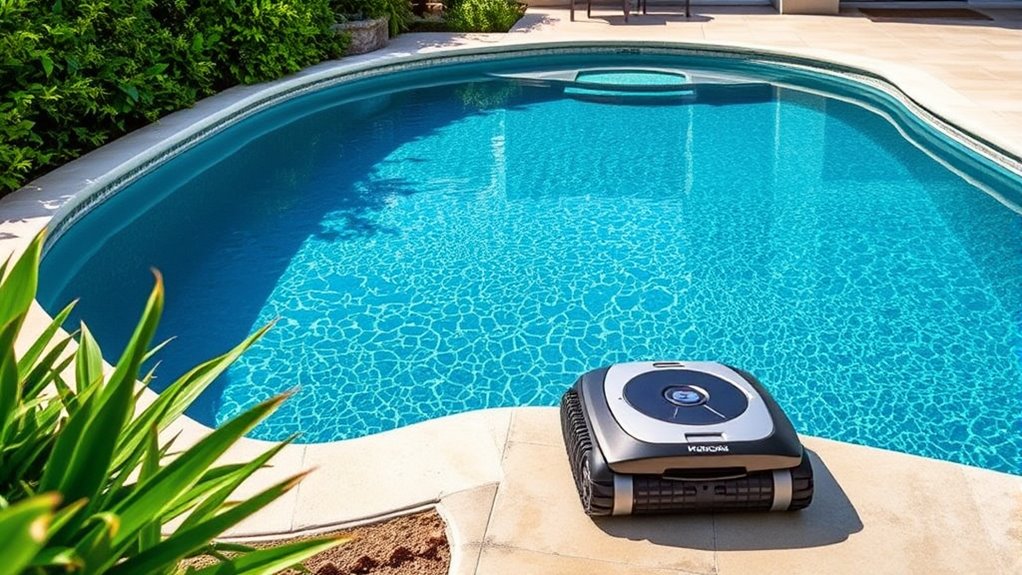
To choose the right automatic pool cleaner, you need to take into account your pool’s size, shape, and surface material. Pool depth influences the cleaner’s reach and maneuverability; deeper pools may require more powerful or versatile models. The shape affects navigation—irregular or complex shapes might need a cleaner with advanced tracking features. Surface material, like plaster, vinyl, or tile, determines the type of cleaning attachment you need to avoid damage. Additionally, water chemistry impacts the longevity of the cleaner’s components; high chlorine levels or pH imbalances can cause wear. The pattern of behavioral issues in your pool can also influence the type of cleaner you select, ensuring it can handle common debris and stains effectively. Conducting an initial inspection of debris types can help determine the most suitable cleaning technology for your needs. Regularly monitoring and adjusting your pool’s chemical balance can help prevent premature wear of the cleaner’s parts, and understanding surface material helps in choosing the most compatible cleaning method. Proper maintenance and understanding of pool surface material can also extend the lifespan of your cleaner and improve its performance.
Evaluating Key Features and Technologies

Evaluating key features and technologies is vital to choosing an automatic pool cleaner that meets your needs. Robotic navigation systems are essential because they determine how effectively the cleaner covers your pool’s surface. Look for models with advanced navigation to ensure thorough cleaning without missing spots or wasting time. The filtration system is equally important; a high-quality system captures dirt, debris, and even fine particles, keeping your water clear. Some cleaners have multi-stage filtration or larger filters for extended use. Consider how the navigation technology interacts with the filtration system—efficient navigation paired with a robust filter results in a cleaner, healthier pool. Additionally, understanding how the security features and attractions in nearby resorts operate can help you make more informed choices when selecting products or routines related to wellness, including pool cleaning. Incorporating herbal remedies into your routine can enhance overall relaxation and health, paralleling how effective pool cleaning supports wellness by maintaining a healthy environment. Focusing on these features helps you select a device that’s both effective and reliable for your specific pool. For example, some models incorporate smart technology that allows remote monitoring and control, increasing convenience and efficiency.
Considering Energy Efficiency and Operating Costs
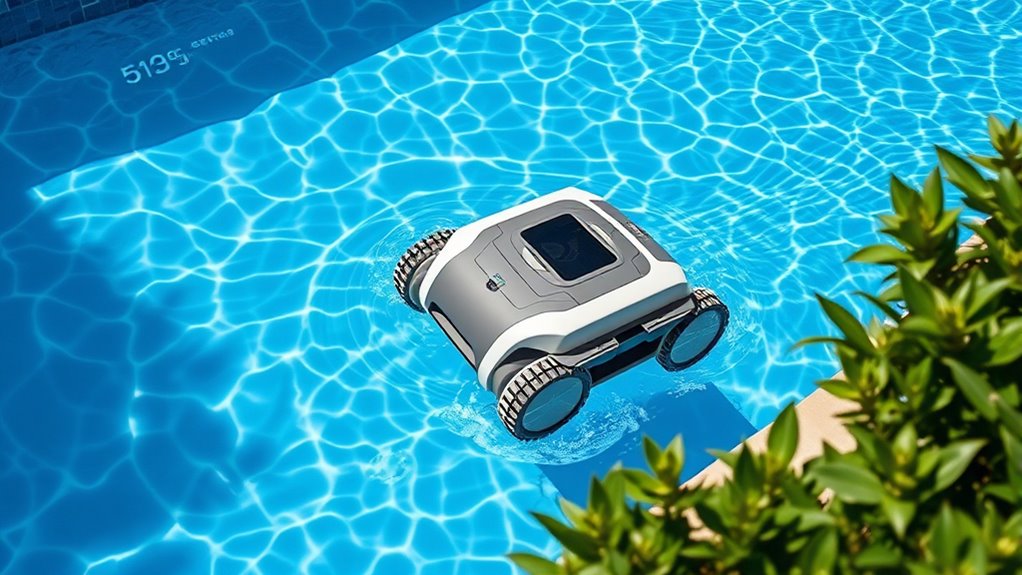
Choosing a pool cleaner that combines effective features with low operating costs can save you money over time. Solar power options are increasingly popular since they harness renewable energy, reducing electricity bills and environmental impact. These cleaners often operate quietly and efficiently without relying solely on your power supply. Manual operation, while sometimes more energy-intensive, allows you to control cleaning sessions and conserve energy when needed. Additionally, some models incorporate energy-efficient motors, which can significantly lower energy consumption during operation. Consider how often your pool needs cleaning—if it’s minimal, manual operation or solar-powered models can be cost-effective choices. Selecting a smart feature-enabled model can further optimize power use and adapt to your pool’s specific cleaning needs. By prioritizing energy efficiency, you’ll reduce ongoing expenses while maintaining a clean, inviting pool. Incorporating energy conservation strategies can further enhance cost savings and environmental benefits over the long term.
Budgeting and Finding Value for Your Investment
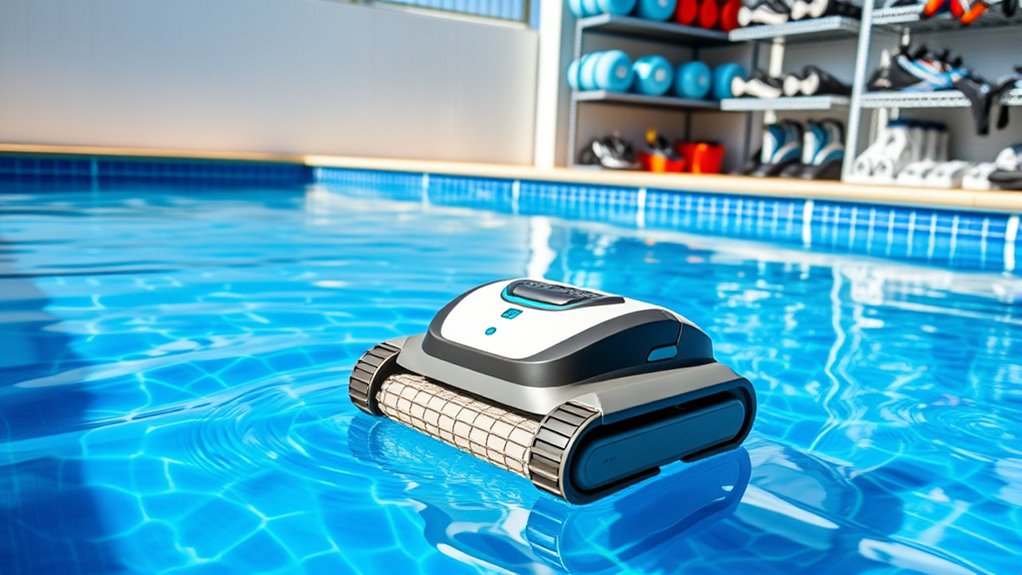
Finding a pool cleaner that offers the best value for your money involves balancing upfront costs with long-term performance and durability. Your budget will influence your options, so consider different pricing options carefully. Keep in mind that a lower price may mean sacrificing features or longevity, while a higher price often reflects better build quality and brand reputation. To maximize value, look for cleaners with solid warranties and reliable performance records. Don’t forget to factor in maintenance costs over time, as these can significantly impact the overall value of your investment. Additionally, understanding best anime movies can help you enjoy leisure activities during pool downtime, making your investment even more worthwhile. Being aware of cookie management and privacy options can also ensure a better online shopping experience when researching different pool cleaners.
Reading Reviews and Comparing Brands
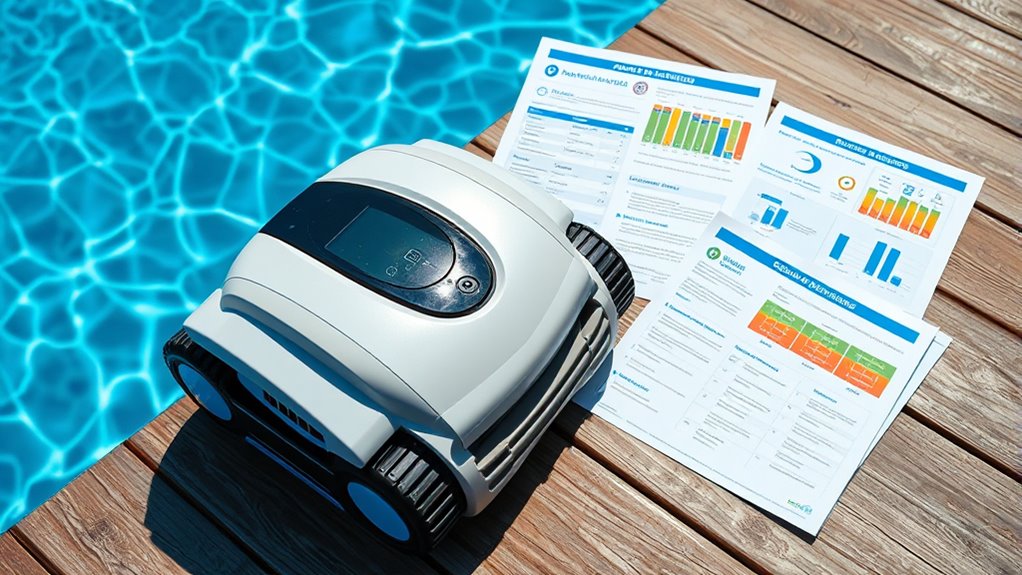
Once you’ve identified a few pool cleaners that fit your budget and offer good value, it’s important to see how they perform in real-world conditions. Reading reviews helps you gauge reliability and effectiveness from actual users. Pay attention to brand reputation, as trusted brands typically deliver quality and durability. Reviews can also reveal common issues and how quickly companies respond to problems. Customer support is vital—good brands provide responsive, helpful assistance if you encounter any troubles. Comparing brands based on reviews helps you avoid options with poor service or unreliable performance. This research ensures you choose a cleaner that not only fits your budget but also offers peace of mind through positive feedback and strong support.
Making the Final Decision and Setting Up Your Cleaner
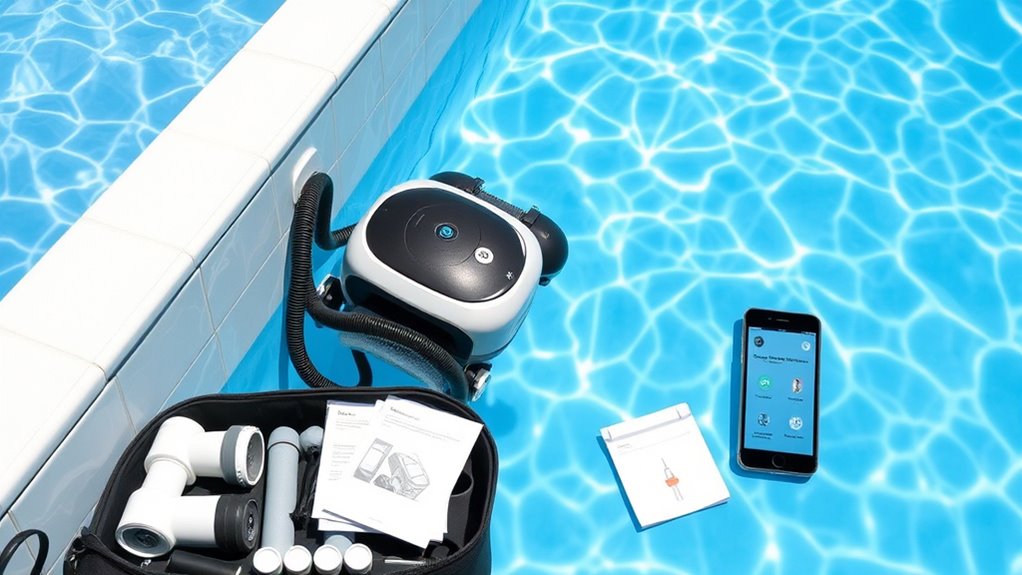
After narrowing down your options based on reviews and your budget, it’s time to make your final decision and set up your new pool cleaner. Start by reading the manufacturer’s instructions carefully to guarantee proper setup. Once installed, familiarize yourself with maintenance tips like regular filter cleaning and debris removal to keep your cleaner running efficiently. Consider replacement options in case parts wear out over time, and keep a few spare parts handy. Proper setup and maintenance will extend your cleaner’s lifespan and improve performance. To help you stay organized, keep a maintenance schedule and record any replacements made. This proactive approach ensures your cleaner operates smoothly and keeps your pool sparkling all season long.
Frequently Asked Questions
How Often Should I Run My Automatic Pool Cleaner?
You should run your automatic pool cleaner regularly to maintain pool safety and guarantee energy efficiency. Typically, running it 2-3 times a week keeps your pool clean and safe for swimming. Adjust frequency based on usage, weather, and debris levels. Consistent cleaning prevents dirt buildup, reducing strain on your system and conserving energy. Regular maintenance also promotes pool safety, making sure your pool remains a healthy, inviting space.
Can Automatic Pool Cleaners Handle Debris Like Leaves and Twigs?
Imagine you’re enjoying a sunny day by your pool, and your automatic cleaner whizzes around, effortlessly handling leaf removal and twig collection. Yes, many automatic pool cleaners are designed to handle debris like leaves and twigs, especially those with strong suction or extra-large debris bags. For pools with lots of fall foliage, consider a model with powerful brushes and larger capacity to keep your pool spotless without constant supervision.
What Maintenance Is Required for Automatic Pool Cleaners?
To keep your automatic pool cleaner working well, you need to do regular filter maintenance and brush replacement. Check and clean the filters often to prevent clogging, and replace brushes when they show signs of wear to guarantee effective cleaning. Keep the cleaner free of debris and inspect for any damage. Regular maintenance not only extends its lifespan but also assures your pool stays spotless and ready for swimming.
Are Robotic Pool Cleaners Suitable for Saltwater Pools?
Ever wondered if robotic pool cleaners can handle saltwater? The good news is, many models now feature saltwater compatibility, ensuring they won’t corrode or lose robotic efficiency. You might worry about durability, but modern designs are built to withstand the corrosive nature of saltwater. So, yes—robotic cleaners are a smart, efficient choice for saltwater pools, keeping your pool pristine without sacrificing performance or longevity.
How Long Do Automatic Pool Cleaners Typically Last?
Automatic pool cleaners usually last around 3 to 5 years, depending on usage and maintenance. You should consider the battery life and motor durability, as these impact longevity. If your cleaner has a powerful, durable motor and a long-lasting battery, it’ll serve you well longer. Regularly cleaning filters and storing the device properly can also extend its lifespan, ensuring you get the most out of your investment.
Conclusion
Choosing the right automatic pool cleaner doesn’t have to feel like searching for a needle in a haystack. By considering your pool’s size, surface, and features, you’ll find a trusty sidekick that keeps your water sparkling—like a knight in shining armor. Just remember to read reviews and compare brands, so your investment lasts longer than a summer’s day. With these tips, you’ll be sailing smoothly into a cleaner, more enjoyable swim—no magic wand needed.
